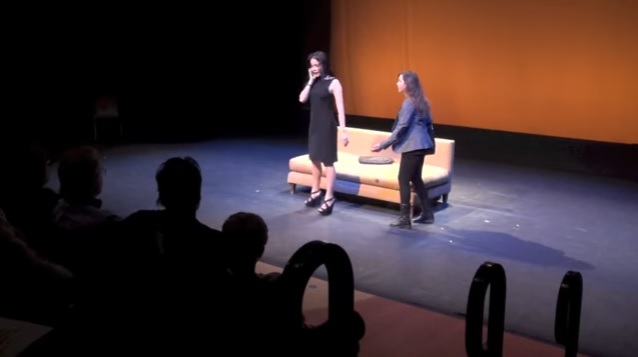Department of English
Faculty of Arts,
Chulalongkorn University
Beauty
(2000)
Jane
Martin
Notes
541 genie:
541 thingamajig:
541 dealing: dealing drugs; taking a narcotic
542 no picnic: not easy
- picnic (Merriam-Webster)
2 a: a pleasant or amusingly carefree experience <I don't
expect being married to be a picnic — Josephine
Pinckney> b: an easy task or feat
543 Rubenstein: suggests the cosmetics brand Helena Rubinstein
543 Cindy Crawford: a supermodel during the 1980s and 1990s

|
|
|
Comprehension Check
- At the opening of the play, what
does the person on the phone probably say to elicit that
response from Carla (541)?
- How is Bethany's uncle doing at
the time the play takes place?
- What does "Look, a screaming
eagle from shoulder to shoulder, maybe" tell us about the
tattoo of the caller (541)?
- What does Bethany's comment
"Naturally. Who else would I meet" tell us about how she
views herself and her love life (541)?
- What
gesture does Bethany make to illustrate why the genie has a
high voice (541)?
- What does Carla's "Uh-huh" mean
in response to Bethany saying that there is a genie in the
lamp (541)?
- What does Bethany plan to do
with $25,000? (541)
- What does Carla's "Oh sure" mean
in response to Bethany telling her that money rains down
from the sky (541)?
- What does Carla suggest is the
reason for Bethany acting "really strange lately" (541)?
- Is Carla 100% naturally
beautiful? (542)
- Carla says that "Half the time,
it never occurs to them [men] to start with a conversation"
(542). What does her description suggest men "start with"
the other half of the time?
- What meaning of "sign" does
Carla understand when she puts down Sagittarius instead of
her signature in the application form (542)?
- Why are there exclamation points
after Bethany/Carla's "Thanks a lot" (543)?
|
|
Study Questions
- Of the benefits of beauty that
Bethany lists, which is the most freeing?
- Of the drawbacks of beauty that
Carla lists, which is the most limiting?
- What limitation seems the most
pressing for Carla because of her lack of beauty?
- Why do the problems from beauty
that Carla lists fail to dissuade Bethany from her desire?
- What is better than beauty for
Carla who used to be Bethany?
- What is better than brains for
Bethany who used to be Carla?
- What stereotypes of beauty and
of brains are used in the play?
- What is the difference between
being Carla and being beautiful?
- What slip up happened that
Bethany's initial statement "I want to be like you" (542)
eventually results in the wrong wish granted?
- "Beauty is the real deal,"
claims Bethany (542)? How real is Carla's beauty? Is this
the same kind of real that Carla asks for with her multiple
expressions: "Very funny" (541), "You're not kidding
what?!," "Is this some elaborate practical joke," or "These
look real"?
- Why is it significant that the
day is Carla's birthday?
|
Review Sheet
Characters
Carla – "I'm the one hanging on by her
fingernails in modeling" (542)
Bethany –
"You're the one with the $40,000 job straight out of school" (542);
"you're only twenty-three" (1248); "I'm a public accountant" (543)
genie –
"twenty-foot-high, see-through guy in like an Arabian outfit" (541)
Bethany's
uncle –
"in Intensive Care after the accident [...] he was hit by two
trucks" (541)
Places
apartment
– "An apartment. Minimalist set." (541)
Vocabulary
light, lighting
sound
props
in medias res
character
characterization
dialogue
pace
delivery
conflict
humor
irony
sarcasm
overstatement
point of view
imagery
diction; denotation, connotation
simile
metaphor
themes
beauty
intelligence
wealth
stereotypes
identity
value
self worth
rationality, irrationality
truth; true
reality; real
Sample
Student Responses to Jane Martin's Beauty
Response 1:
Reference
Links
|
- Jane Martin, Beauty,
Literature: An Introduction to Fiction, Poetry,
Drama, and Writing, eds. X. J. Kennedy and Dana
Gioia (2007)
|
Media
|

|
- Beauty,
dir. Gerard Doyle, Ross School (2013; 10:16 min.)
|
|
- Beauty, perf. Meredith Watson
and Helen Hayden, Scene Night (2012; 4:54 min.)
|
|
|
Reference
Martin,
Jane. Beauty. Lit, edited by Laurie G Kirszner and
Stephen R. Mandell, Wadsworth, 2012, pp. 541–43.
Martin,
Jane. Beauty. The Literary Experience, edited by
Bruce Beiderwell, and Jeffery M. Wheeler, Thomson Wadsworth, 2008, pp.
1245–51.
Martin, Jane. Beauty.
Literature: An Introduction to Fiction, Poetry, Drama, and Writing,
edited by X. J. Kennedy and Dana Gioia, 10th ed., Pearson
Longman, 2007, pp. 1269–73.
Further Reading
Martin, Jane. Collected Plays, 1980–1995. Smith and Kraus, 1995.
Martin, Jane. Collected Plays, 1996–2001. Ed. Michael Bigelow Dixon.
Smith and Kraus, 1995.
Home | Literary
Terms | English Help
Last updated August 20, 2017

